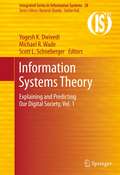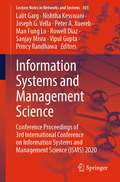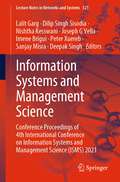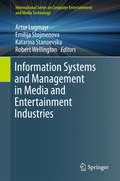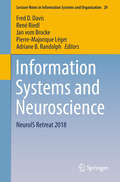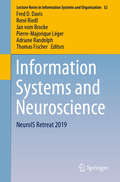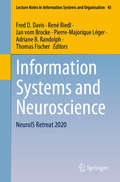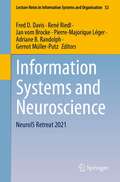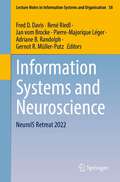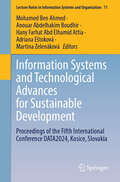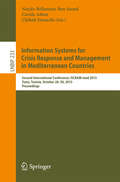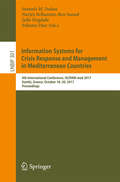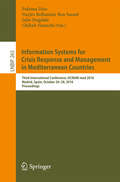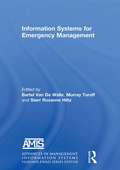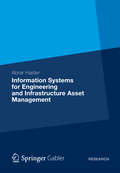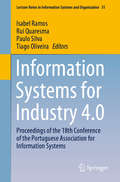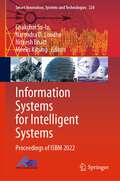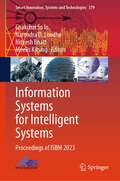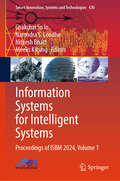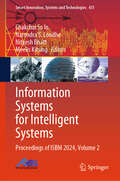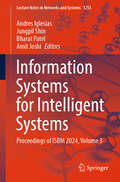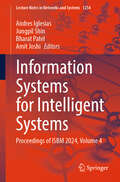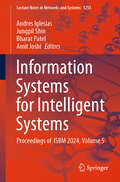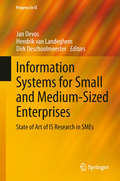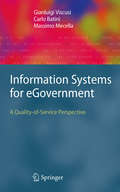- Table View
- List View
Information Systems Theory: Explaining and Predicting Our Digital Society, Vol. 1
by Yogesh K. Dwivedi Michael R. Wade Scott L. SchnebergerThe overall mission of this book is to provide a comprehensive understanding and coverage of the various theories and models used in IS research. Specifically, it aims to focus on the following key objectives: To describe the various theories and models applicable to studying IS/IT management issues. To outline and describe, for each of the various theories and models, independent and dependent constructs, reference discipline/originating area, originating author(s), seminal articles, level of analysis (i.e. firm, individual, industry) and links with other theories. To provide a critical review/meta-analysis of IS/IT management articles that have used a particular theory/model.To discuss how a theory can be used to better understand how information systems can be effectively deployed in today's digital world. This book contributes to our understanding of a number of theories and models. The theoretical contribution of this book is that it analyzes and synthesizes the relevant literature in order to enhance knowledge of IS theories and models from various perspectives. To cater to the information needs of a diverse spectrum of readers, this book is structured into two volumes, with each volume further broken down into two sections. The first section of Volume 1 presents detailed descriptions of a set of theories centered around the IS lifecycle, including the Success Model, Technology Acceptance Model, User Resistance Theories, and four others. The second section of Volume 1 contains strategic and economic theories, including a Resource-Based View, Theory of Slack Resources, Portfolio Theory, Discrepancy Theory Models, and eleven others. The first section of Volume 2 concerns socio-psychological theories. These include Personal Construct Theory, Psychological Ownership, Transactive Memory, Language-Action Approach, and nine others. The second section of Volume 2 deals with methodological theories, including Critical Realism, Grounded Theory, Narrative Inquiry, Work System Method, and four others. Together, these theories provide a rich tapestry of knowledge around the use of theory in IS research. Since most of these theories are from contributing disciplines, they provide a window into the world of external thought leadership.
Information Systems and Management Science: Conference Proceedings of 3rd International Conference on Information Systems and Management Science (ISMS) 2020 (Lecture Notes in Networks and Systems #303)
by Sanjay Misra Vipul Gupta Lalit Garg Nishtha Kesswani Joseph G. Vella Peter A. Xuereb Man Fung Lo Rowell Diaz Princy RandhawaThe book introduces concepts, principles, methods and procedures that will be valuable to students and scholars in thinking about existing organization systems, proposing new systems and working with management professionals in implementing new information systems. This book of Information Systems and Management Science (proceedings of ISMS 2020) is intended to be used as a reference by students and researchers who collect scientific and technical contributions with respect to models, tools, technologies and applications in the field of information systems and management science. This textbook shows how to exploit information systems in a technology-rich management field.
Information Systems and Management Science: Conference Proceedings of 4th International Conference on Information Systems and Management Science (ISMS) 2021 (Lecture Notes in Networks and Systems #521)
by Sanjay Misra Deepak Singh Lalit Garg Nishtha Kesswani Imene Brigui Dilip Singh Sisodia Joseph G Vella Peter XuerebThis multidisciplinary book delves into information systems’ concepts, principles, methods and procedures and their innovative applications in management science and other domains, including business, industry, health care and education. It will be valuable to students, researchers, academicians, developers, policymakers and managers thriving to improve their information and management systems, develop new strategies to solve complex problems and implement novel techniques to utilise the massive data best. This book of Information Systems and Management Science (proceedings of ISMS 2021) is intended to be used as a reference by scholars, scientists and practitioners who collect scientific and technical contributions concerning models, tools, technologies and applications in the field of information systems and management science. This book shows how to exploit information systems in a technology-rich management field.
Information Systems and Management in Media and Entertainment Industries
by Artur Lugmayr Katarina Stanoevska Emilija Stojmenova Robert WellingtonThis book defines an agenda for research in information management and systems for media and entertainment industries. It highlights their particular needs in production, distribution, and consumption. Chapters are written by practitioners and researchers from around the world, who examine business information management and systems in the larger context of media and entertainment industries. Human, management, technological, and content creation aspects are covered in order to provide a unique viewpoint. With great interdisciplinary scope, the book provides a roadmap of research challenges and a structured approach for future development across areas such as social media, eCommerce, and eBusiness. Chapters address the tremendous challenges in organization, leadership, customer behavior, and technology that face the entertainment and media industries every day, including the transformation of the analog media world into its digital counterpart. Professionals or researchers involved with IT systems management, information policies, technology development or content creation will find this book an essential resource. It is also a valuable tool for academics or advanced-level students studying digital media or information systems.
Information Systems and Neuroscience: Gmunden Retreat On Neurois 2016 (Lecture Notes in Information Systems and Organisation #16)
by Jan Vom Brocke René Riedl Pierre-Majorique Léger Fred D. Davis Adriane B. RandolphThis book presents the proceedings of the NeuroIS Retreat 2018, June 19-21, Vienna, Austria, reporting on topics at the intersection of Information Systems (IS) research, neurophysiology and the brain sciences. Readers will discover the latest findings from top scholars in the field of NeuroIS, which offer detailed insights on the neurobiology underlying IS behavior, essential methods and tools and their applications for IS, as well as the application of neuroscience and neurophysiological theories to advance IS theory.
Information Systems and Neuroscience: NeuroIS Retreat 2019 (Lecture Notes in Information Systems and Organisation #32)
by Thomas Fischer Jan Vom Brocke René Riedl Pierre-Majorique Léger Fred D. Davis Adriane RandolphThis book presents the proceedings of the NeuroIS Retreat 2019, held on June 4–6 in Vienna, Austria, reporting on topics at the intersection of information systems (IS) research, neurophysiology and the brain sciences. Featuring the latest findings from top scholars in the field, it offers detailed insights into the neurobiology underlying IS behavior, essential methods and tools and their applications for IS, as well as applying neuroscience and neurophysiological to advance IS theory.
Information Systems and Neuroscience: NeuroIS Retreat 2020 (Lecture Notes in Information Systems and Organisation #43)
by Thomas Fischer Jan Vom Brocke René Riedl Pierre-Majorique Léger Fred D. Davis Adriane B. RandolphThis book presents the proceedings of the virtual conference NeuroIS Retreat 2020, June 2–4, hosted in Austria, reporting on topics at the intersection of information systems (IS) research, neurophysiology and the brain sciences. Readers will discover the latest findings from top scholars in the field of NeuroIS, which offer detailed insights on the neurobiology underlying IS behavior, essential methods and tools and their applications for IS, as well as the application of neuroscience and neurophysiological theories to advance IS theory.
Information Systems and Neuroscience: NeuroIS Retreat 2021 (Lecture Notes in Information Systems and Organisation #52)
by Jan Vom Brocke René Riedl Pierre-Majorique Léger Fred D. Davis Adriane B. Randolph Gernot Müller-PutzThis book presents the proceedings of the NeuroIS Retreat 2021, June 1-3, virtual conference, reporting on topics at the intersection of information systems (IS) research, neurophysiology and the brain sciences. Readers will discover the latest findings from top scholars in the field of NeuroIS, which offer detailed insights on the neurobiology underlying IS behavior, essential methods and tools and their applications for IS, as well as the application of neuroscience and neurophysiological theories to advance IS theory.
Information Systems and Neuroscience: NeuroIS Retreat 2022 (Lecture Notes in Information Systems and Organisation #58)
by Jan Vom Brocke René Riedl Pierre-Majorique Léger Fred D. Davis Adriane B. Randolph Gernot R. Müller-PutzThis book presents the proceedings of the NeuroIS Retreat 2022, June 14-16, Vienna, Austria, reporting on topics at the intersection of information systems (IS) research, neurophysiology and the brain sciences. Readers will discover the latest findings from top scholars in the field of NeuroIS, which offer detailed insights on the neurobiology underlying IS behavior, essential methods and tools and their applications for IS, as well as the application of neuroscience and neurophysiological theories to advance IS theory.
Information Systems and Technological Advances for Sustainable Development: Proceedings of the Fifth International Conference DATA2024, Kosice, Slovakia (Lecture Notes in Information Systems and Organisation #71)
by Mohamed Ben Ahmed Anouar Abdelhakim Boudhir Hany Farhat Abd Elhamid Attia Adriana Eštoková Martina ZelenákováThis multidisciplinary book highlights the latest advances in the field of Information and Communication Technologies (ICTs) and various research domains crucial for sustainable development. It features original contributions from distinguished international scholars, who introduce groundbreaking concepts presented at the 5th International Conference on Digital Age & Technological Advances for Sustainable Development, held in Košice, Slovakia on May 27-29, 2024. As a comprehensive resource, the book will benefit all Ph.D. students, researchers, and industry professionals seeking profound insights into Artificial Intelligence, Industry 4.0, Sustainable Development, and the Green Economy, helping them navigate and contribute to the ever-evolving landscape of sustainable technology and development. Further, it builds upon insights and experiences from previous conference editions, making it an indispensable addition to the extant literature in this dynamic field.
Information Systems for Crisis Response and Management in Mediterranean Countries
by Narjès Bellamine Ben Saoud Carole Adam Chihab HanachiThis book constitutes the refereed proceedings of the Second International Conference on Information Systems for Crisis Response and Management in Mediterranean Countries, ISCRAMmed 2015, held in Tunis, Tunisia, in October 2015. The objectives of the ISCRAMmed conference are to provide an outstanding opportunity and an international forum for local and international researchers, practitioners, and policy makers to address and discuss new trends and challenges with respect to information systems for crisis response and disaster management. The 14 full papers and 4 short papers presented in this volume were carefully reviewed and selected from 41 submissions. They are organized in topical sections on social computing, modeling and simulation, information and knowledge management, engineering of emergency management systems, and decision support systems and collaboration.
Information Systems for Crisis Response and Management in Mediterranean Countries: 4th International Conference, ISCRAM-med 2017, Xanthi, Greece, October 18-20, 2017, Proceedings (Lecture Notes in Business Information Processing #301)
by Ioannis M. Dokas, Narjès Bellamine-Ben Saoud, Julie Dugdale and Paloma DíazThis book constitutes the refereed proceedings of the 4th International Conference on Information Systems for Crisis Response and Management in Mediterranean Countries, ISCRAM-med 2017, held in Xanthi, Greece, in October 2017. ISCRAM-med conferences aim to enhance the collaboration and solidarity between Mediterranean countries in issues related to crisis management. They offer an outstanding opportunity to address and discuss new trends and challenges in the area of Information systems and Technologies for Crisis Response and Management (ISCRAM). The 12 full and 5 short papers presented in this volume were carefully reviewed and selected from 39 submissions. They were organized in topical sections named: social networking and big data analytics; robotic systems for crisis management; decision making in the context of crisis management; serious games and simulations; and collaboration and information sharing.
Information Systems for Crisis Response and Management in Mediterranean Countries: Third International Conference, ISCRAM-med 2016, Madrid, Spain, October 26-28, 2016, Proceedings (Lecture Notes in Business Information Processing #265)
by Paloma Díaz, Narjès Bellamine Ben Saoud, Julie Dugdale and Chihab HanachiThis book constitutes the refereed proceedings of the Third International Conference on Information Systems for Crisis Response and Management in Mediterranean Countries, ISCRAM-med 2016, held in Madrid, Spain, in October 2016. Information systems and technologies can play a key role in crisis management in order to support preparation, response, mitigation and recovery processes. Yet technology is not enough to guarantee a better management process, and therefore the conference does not only focus on engineering technologies, but also on their application and practical experiences. The 12 full and 8 short papers presented in this volume were carefully reviewed and selected from 36 submissions. They are organized in topical sections on mobile apps for citizens, modeling and simulation, development of information systems, information and knowledge management, collaboration and coordination, social computing, and issues in humanitarian crisis.
Information Systems for Emergency Management (Advances In Management Information Systems Ser.)
by Bartel Van De Walle Murray Turoff Starr Roxanne HiltzThis book provides the most current and comprehensive overview available today of the critical role of information systems in emergency response and preparedness. It includes contributions from leading scholars, practitioners, and industry researchers, and covers all phases of disaster management - mitigation, preparedness, response, and recovery. 'Foundational' chapters provide a design framework and review ethical issues. 'Context' chapters describe the characteristics of individuals and organizations in which EMIS are designed and studied. 'Case Study' chapters include systems for distributed microbiology laboratory diagnostics to detect possible epidemics or bioterrorism, humanitarian MIS, and response coordination systems. 'Systems Design and Technology' chapters cover simulation, geocollaborative systems, global disaster impact analysis, and environmental risk analysis. Throughout the book, the editors and contributors give special emphasis to the importance of assessing the practical usefulness of new information systems for supporting emergency preparedness and response, rather than drawing conclusions from a theoretical understanding of the potential benefits of new technologies.
Information Systems for Engineering and Infrastructure Asset Management
by Abrar HaiderEngineering and infrastructure assets maintain the lifeline of economies. It is, therefore, critical to manage these assets in such a way that they provide a consistent level of service throughout their lifecycle. Management of asset lifecycle, however, is information intensive and utilises a plethora of information systems. The role of theses systems in asset management is much more profound. It extends beyond the organizational boundaries and addresses business relationships with external stakeholders to deliver enhanced level of business outcomes. In doing so information systems are not only required to translate business strategic considerations into action, but are also expected to produce learnings and feedback that informs business strategy and aids in strategic reorientation.
Information Systems for Industry 4.0: Proceedings of the 18th Conference of the Portuguese Association for Information Systems (Lecture Notes in Information Systems and Organisation #31)
by Isabel Ramos Rui Quaresma Paulo Silva Tiago OliveiraThis book provides a selection of the best papers presented at the 18th Conference of the Portuguese Association for Information Systems (CAPSI), which was held in 2018. The focus of the conference and of these proceedings lies on the interplay between information systems and Industry 4.0. All contributions, which include original research, review papers and case studies, were peer-reviewed in a double blind process.
Information Systems for Intelligent Systems: Proceedings of ISBM 2022 (Smart Innovation, Systems and Technologies #324)
by Chakchai So-In Meelis Kitsing Narendra D. Londhe Nityesh BhattThis book includes selected papers presented at World Conference on Information Systems for Business Management (ISBM 2022), held in Bangkok, Thailand, during September 2–3, 2022. It covers up-to-date cutting-edge research on data science, information systems, infrastructure and computational systems, engineering systems, business information systems, and smart secure systems.
Information Systems for Intelligent Systems: Proceedings of ISBM 2023 (Smart Innovation, Systems and Technologies #379)
by Meelis Kitsing Narendra D. Londhe Nityesh Bhatt Chakchai So InThis book includes selected papers presented at the World Conference on Information Systems for Business Management (ISBM 2023), held in Bangkok, Thailand, on September 7–8, 2023. It covers up-to-date cutting-edge research on data science, information systems, infrastructure and computational systems, engineering systems, business information systems, and smart secure systems.
Information Systems for Intelligent Systems: Proceedings of ISBM 2024, Volume 1 (Smart Innovation, Systems and Technologies #430)
by Meelis Kitsing Nityesh Bhatt Chakchai So In Narendra S. LondheThis book includes selected papers presented at the World Conference on Information Systems for Business Management (ISBM 2024), held in Bangkok, Thailand, on September 12–13, 2024. It covers up-to-date cutting-edge research on data science, information systems, infrastructure and computational systems, engineering systems, business information systems, and smart secure systems.
Information Systems for Intelligent Systems: Proceedings of ISBM 2024, Volume 2 (Smart Innovation, Systems and Technologies #431)
by Meelis Kitsing Nityesh Bhatt Chakchai So In Narendra S. LondheThis book includes selected papers presented at the World Conference on Information Systems for Business Management (ISBM 2024), held in Bangkok, Thailand, on September 12–13, 2024. It covers up-to-date cutting-edge research on data science, information systems, infrastructure and computational systems, engineering systems, business information systems, and smart secure systems.
Information Systems for Intelligent Systems: Proceedings of ISBM 2024, Volume 3 (Lecture Notes in Networks and Systems #1253)
by Amit Joshi Bharat Patel Andres Iglesias Jungpil ShinThis book includes selected papers presented at World Conference on Information Systems for Business Management (ISBM 2024), held in Bangkok, Thailand, during September 12–13, 2024. It covers up-to-date cutting-edge research on data science, information systems, infrastructure and computational systems, engineering systems, business information systems, and smart secure systems.
Information Systems for Intelligent Systems: Proceedings of ISBM 2024, Volume 4 (Lecture Notes in Networks and Systems #1254)
by Amit Joshi Bharat Patel Andres Iglesias Jungpil ShinThis book includes selected papers presented at World Conference on Information Systems for Business Management (ISBM 2024), held in Bangkok, Thailand, during September 12–13, 2024. It covers up-to-date cutting-edge research on data science, information systems, infrastructure and computational systems, engineering systems, business information systems, and smart secure systems.
Information Systems for Intelligent Systems: Proceedings of ISBM 2024, Volume 5 (Lecture Notes in Networks and Systems #1255)
by Amit Joshi Bharat Patel Andres Iglesias Jungpil ShinThis book includes selected papers presented at World Conference on Information Systems for Business Management (ISBM 2024), held in Bangkok, Thailand, during September 12–13, 2024. It covers up-to-date cutting-edge research on data science, information systems, infrastructure and computational systems, engineering systems, business information systems, and smart secure systems.
Information Systems for Small and Medium-sized Enterprises
by Jan Devos Hendrik Landeghem Dirk DeschoolmeesterThis book establishes and explores existing and emerging theories on Small and Medium-sized Enterprises (SMEs) and the adoption of IT/IS. It presents the latest empirical research findings in that area of IS research and explores new technologies and practices. The book is written for researchers and professionals working in the field of IS research or the research of SMEs. Moreover, the book will be a reference for researchers, professionals and students in management information systems science and related fields.
Information Systems for eGovernment
by Prof. Carlo Univ. degli Studi di Milano Gianluigi Viscusi Massimo MecellaThe success of public sector investment in eGovernment initiatives strongly depends on effectively exploiting all aspects of ICT systems and infrastructures. The related objectives are hardly reachable without methodological frameworks that provide a holistic perspective and knowledge on the contexts of eGovernment initiatives. Yet public administrators usually have a mix of legal and administrative knowledge, while lacking an information systems background. With this book, Viscusi, Batini and Mecella provide a comprehensive methodology for service-oriented information systems planning, with special emphasis on eGovernment initiatives. They present the eG4M methodology which structurally supports the development of optimal eGovernment plans, considering technological, organizational, legal, economic and social aspects alike. The approach is focused on two pillars: the quality of the provided services and related processes, and the quality of the data managed in the administrative processes and services. The book is written for public administrators, decision-makers, practitioners, ICT professionals and graduate students, providing a comprehensive perspective of the challenges, opportunities and decisions related to strategic and operational planning of service-oriented information systems in eGovernment.
